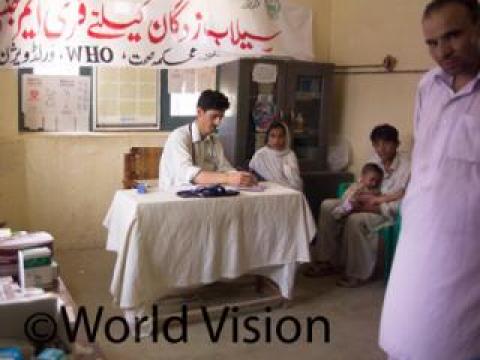Shopkeeper and caregiver is grateful for medical aid

Badar Munir is not sick and needs no clinical help, still he visits the World Vision Emergency Medical Camp every day in Koto village near Lower Dir. Why? The village shopkeeper wants to ensure that all the sick and suffering people in his village take advantage of the free medical help being provided by World Vision. A doctor and "Lady Health Visitor" run the clinic, which means both men and women can seek help here in a culturally acceptable way. A shortage of female medical staff elsewhere makes it extremely difficult for many women and their children to receive the care they need. Koto is located only a few kilometres from the city centre in Lower Dir, yet torrential rains and flash floods cut off the village from the district headquarters for more than 10 days. And it happened with no warning. Badar, a small shopkeeper, was fast asleep when the first heavy rains flooded the whole area. The bridge over the river at Odigram was destroyed by the gushing hill torrents in the wake of the heaviest monsoon downpours in 80 years. The Balambat bridge at the Panjkorra river – the other route out of the area and connection with the city and beyond — was also badly damaged and closed to all traffic. “We were cut-off from the entire world. All the roads were closed as bridges collapsed. There was no electricity. All shops ran out of provisions. There was nothing left to eat. It was a tough ordeal with houses collapsing left and right amidst unceasing downpour from the sky and roaring hill torrent all around”, shares Badar. As flood waters receded, medical needs in Koto became desperate. The only food available is that which is being grown, and disease is on the increase while medicines remain short in supply. Lower Dir and surrounding villages like Koto had been without electricity for many days. “Crops rotted in the fields. Trees were uprooted including fruit bearing ones like oranges, peaches, apples and apricots. “There was so much water that you could not make out the landscape any longer. And the roar of the flood waters was deafening and all around us”, shares Badar Munir. Badar is not married, but he is responsible for the five children of his deceased brother. He was the first person to come seeking medical help for these five children as soon as World Vision set up the facility in his village. World Vision is concerned that water-borne diseases such as diarrhea and cholera will spread among the homeless. Children are already reported to be suffering from skin diseases and eye infections. World Vision has opened five emergency health clinics in Lower Dir and so far has treated more than 3,200 people – including more than 640 children – who are suffering from water-borne diseases and other illnesses related to the floods. These emergency medical facilities are working through close partnership with the World Health Organisation and the local government health departments. World Vision also plans to distribute water purification packets and hygiene kits to 150,000 people, tents to 22,500, cooking items to 75,000, and food to at least 37,500. The organisation also aims to provide cash-for-work activities to 1,000 people. Children play outside the Koto Emergency Health Clinic in this remote village – there is nowhere else that’s safe and dry. World Vision aims to set up 20 child-friendly spaces and 20 women-friendly spaces to provide a safe and comfortable environment for children and women to interact with peers and receive support.